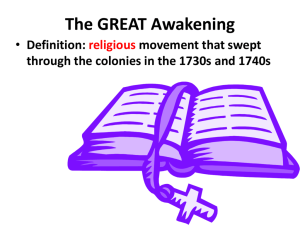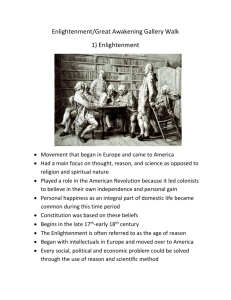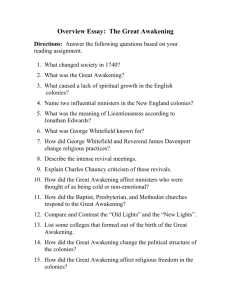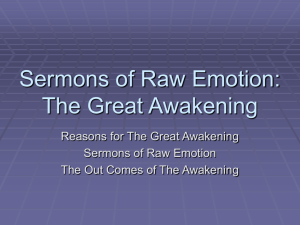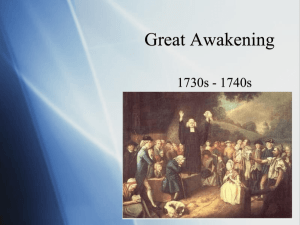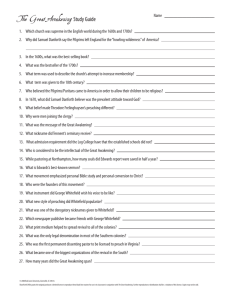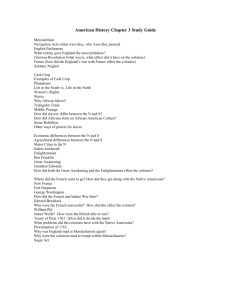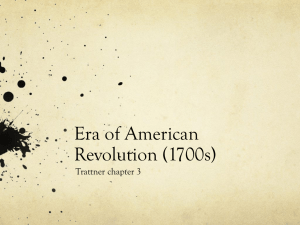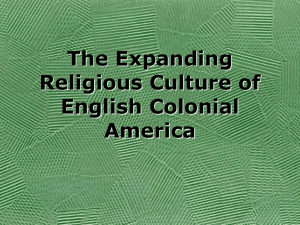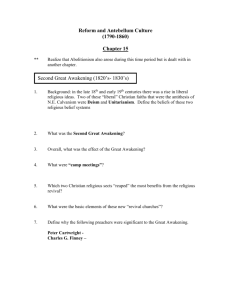What was the Great Awakening?
advertisement
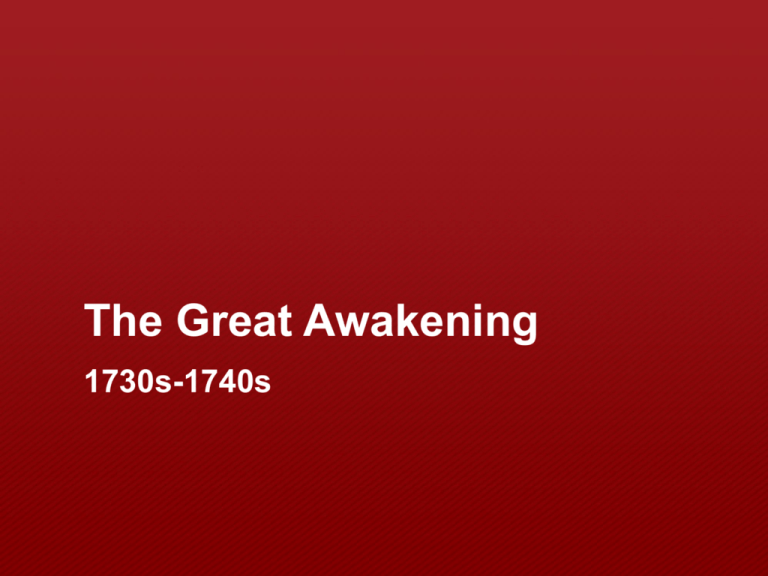
The Great Awakening 1730s-1740s Questions • What was the significance of the Enlightenment in America? • In what ways did the Enlightenment and the Great Awakening prompt Americans to challenge traditional sources of authority? • How did the Baptists in Virginia challenge conventional assumptions about race, gender, and class in the colony? THE ENLIGHTENMENT INFLUENCED THE COLONISTS Philosophical movement throughout Europe in the 17th and 18th centuries Emphasis on REASON as the most important human ability John Locke, a philosopher, argued that people possessed “natural rights” given to humans by God: life, liberty, property. LOCKE The purpose of government, then, was to protect those rights. Others, like the Baron de Montesquieu, argued that absolute monarchy went against natural, God-given rights In this manner, colonial leaders believed British government was violating these rights; how were they to overcome oppression? MONTESQUIEU What was the Great Awakening? George Whitefield preaching •Religious revival movement •Evangelicalism – “new birth” considered the ultimate religious experience •Followers accepted that they were sinners and asked for salvation 4 Before the Great Awakening •Before the 1730s, most colonies had two established religions. •Congregationalism was the largest religion in New England (Puritans and other dissidents who broke away from the Church of England). •Anglicanism was the largest religion in New York and the Southern colonies (same as the Church of England). 5 Old Lights vs. New Lights •Churches that grew as a result of the Great Awakening: Presbyterianism, Methodism, Baptism (New Lights) •Great Awakening challenged authority and hierarchy of established churches (Old Lights: Congregationalists and Anglicans) •Great Awakening said that anybody could be converted and born again. You didn’t need traditional church leadership to decide whether or not you belonged. 6 Leaders of the Great Awakening George Whitefield Jonathan Edwards 7 Central Historical Question: Why was George Whitefield so popular? Review: The Great Awakening GA: religious movement throughout colonies in 1700s, based on revivalism—stressed individual religious experience rather than needing church leaders as intermediary with God Contributed to a sense of quality for all, since all were qualified to take an active role in the church INFLUENTIAL MINISTERS JONATHON EDWARDS Widely believed that this movement was a major factor leading to a sense of freedom and independence within the colonies GEORGE WHITEFIELD Review: The Great Awakening ∞ Some Puritans moved away from original ideal, beginning to seek material comforts ∞As result, Puritan church attendance declined ∞Some Puritan clergy, such as Edwards and Whitefield sought to restore the “ideal” and increase church attendance through a “rebirth” of religion ∞Sought to Christianize all of North America, by bringing Native Americans and Africans into organized religion Similarities/Differences of the Enlightenment and the Great Awakening Enlightenment sought to use scientific methods and rational thought to explain natural phenomena as something beyond an “act of God” Great Awakening saw Puritan ideal in saving people from decay; sought to return people back to religious lifestyle Enlightenment supported reason; GA supports emotionalism and religious faith Both groups question traditional authority and practice Both groups highlight the importance of the individual over the authority of the government or church
